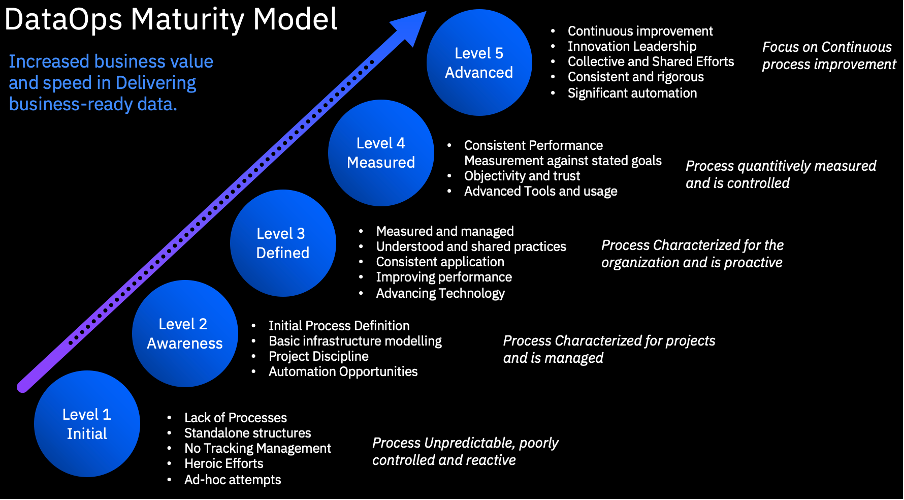This blog was cowritten with Sonia Mezzetta
There are several publications on what DataOps is and its technological benefits associated with streamlining data management. However, what are the tangible business benefits to drive adoption of this data management ecosystem? To understand the business value of DataOps, you first have to understand how data can make your business successful.
Digital Transformation
Organizations are looking to gain a competitive advantage. They are transforming the way they do business by understanding how to best leverage people, process and technology. Exploring technologies like cloud, data analytics, artificial intelligence and others to create new revenue opportunities. Cloud computing takes the headache away and costs associated with managing infrastructure. Data analytics and AI can digest massive amounts of data and provide business insights such as what a customer cares most about to tailor their experience with the goal of driving profit. Automation reduces cycle time, therefore reducing cost.
At the end of day, digital transformation seeks to achieve:
- Revenue Growth
- Profitability
- Lower Costs
- Reduced Risk
So what is the common denominator in digital transformation?
Data! A successful digital transformation relies on having the right data, with high quality, governed and quickly available. If you are making predictions and tailoring a customer’s experience on a mobile application based on the number of times they browse a product to later find the data used was stale. You just wasted your time and money and failed! Yet you were on the right path. Except, you overlooked the key foundation to success in a digital transformation journey, quality and rapidly available data.
What is DataOps?
DataOps promises to streamline the process of building, changing, and managing data pipelines. Its primary goal is to maximize the business value of data and improve a client’s experience in data delivery. It does this by speeding up the distribution of data for reporting and analytic output, while simultaneously reducing data defects and lowering costs. It does this by taking a modern approach to data management via automation, quality control, reusability and self-service.
DataOps Business Value
Delivering business-ready, trusted, high-quality data rapidly is the key value statement.
What’s in it for the business stakeholders (e.g. Chief Marketing Officers, Chief Financial Officers)?
- Fuel continuous and fast innovation for the business by enabling self-service access to trusted, high-quality data
- Enables continuous delivery of data by automating data governance, integration while safeguarding regulatory concerns
- Provides a feedback loop for continuous learning by monitoring and optimizing data pipelines
What’s in it for the technical stakeholders (e.g. Chief Information Officers, Chief Data Officers, Chief Technology Officers)?
- Correct the misalignment of people and goals by fostering closer links between IT system support, operations, and the business
- Accelerate the delivery of changes and improve delivery quality by introducing automation throughout the data delivery cycle
- Improve insight into the real value of metadata and data by using results to drive optimization
Maturity levels to achieve business benefits
For any organization on a DataOps journey, consider the trade off in the level of investment necessary to achieve DataOps maturity versus the business benefits it will accrue. Investment will require time, money and a culture change.
Fundamentally, the DataOps maturity model is a factor of both the level of automation that an organization can bring to bear to their data processes and the breadth of data technologies across their different lines of business that focus on quality data.

In order for an organization to progress through the different levels of this maturity model :
- Initial to Awareness : Stabilize the environment through basic process management
- Awareness to Defined : Develop common processes through engineering management
- Defined to Measured : Control variation through quantitive management
- Measured to Advanced : Continuously improve processes through change managemen
Summary
Digital transformation initiatives do not guarantee success or always achieve the desired profit or cost cutting objectives. The key ingredients are there, but if you don’t have the right recipe, the outcome is unpredictable. DataOps is an approach to strategically implement modern data management. Automation and continuous delivery are key drivers to achieve speed which leads to reduced costs. It has a laser focus on data quality to achieve data trust in business insights. It has a people dimension that focuses on collaboration across technical and business roles. Delivering data faster, cheaper with quality on a continuous basis is the recipe to increased revenue, and profit.
#DataOps#GlobalDataOps